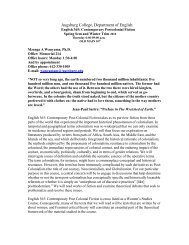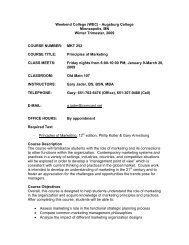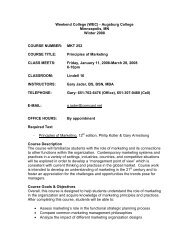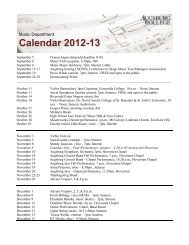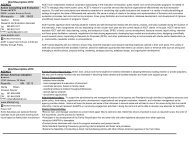You also want an ePaper? Increase the reach of your titles
YUMPU automatically turns print PDFs into web optimized ePapers that Google loves.
An Introduction<br />
Hi and Welcome!<br />
Hi! We spent one year teaching Challenge Math to fifth graders in Northfield, Minnesota, and we created<br />
this curriculum to provide you with fun lessons that you can use when you teach Challenge Math. The lessons<br />
are organized by topic, and we recommend that you spend two to four weeks on a topic before moving on to the<br />
next one. We’ve provided you with more lessons than it would be possible to teach in a year, so feel free to pick<br />
out your favorites.<br />
We were all math majors at Carleton <strong>College</strong>, so we think that math is pretty cool. Math, though, is not just<br />
fun at the college level; it’s fun at the elementary and middle school levels as well. Math teaches students how<br />
to use their imaginations to solve problems, and thus encourages them to think creatively. Math also teaches students<br />
how to organize and explain their thoughts, which is a skill that they can apply to all areas of their lives.<br />
It’s true that math can be hard and sometimes frustrating for students, but as long as the lesson remains fun, with<br />
your guidance your students will work past their frustrations and achieve success!<br />
Where are Fifth Graders Developmentally?<br />
Fifth graders are in a period of transition. From approximately the ages of 6-12, children develop the ability<br />
to think about concrete events, which they can physically see and manipulate. By the end of this developmental<br />
stage, children have the ability to observe more than one quality of an object at a time and can classify objects<br />
according to multiple characteristics. They should also understand the concept of conservation by the end of this<br />
stage. A classic example of conservation is that the volume of a short, fat glass can be the same as the volume<br />
of a tall thin glass, even though one of the glasses may look bigger. Fifth graders should be able to tell you how<br />
the taller glass compensates for the shorter one. They should have also developed a sense of identity (the idea<br />
that if nothing has been added to or subtracted from an initial quantity, the initial amount will remain the same).<br />
Finally, 5th graders should have developed a sense of reversibility; they can explain how one effect can reverse<br />
or negate another, such as addition negating subtraction or multiplication negating division.<br />
These breakthroughs are very important because they are necessary for the development of mathematical<br />
reasoning. Many adults never progress beyond this stage of development because the next stage can require<br />
a bit of difficult intellectual digging. Challenge Math provides the perfect opportunity to help students begin<br />
this next stage, which is commonly referred to as the formal thinking stage. In this stage, students develop the<br />
mental processes necessary for thinking about abstract events, which are not visible or tangible. Thinking abstractly<br />
can prove to be much more difficult than thinking about concrete objects or events. It requires a mental<br />
cataloguing of ideas that must be practiced and encouraged. The ability to think abstractly is important, if not<br />
necessary, for success in all areas of education. Developing this ability can begin with opening one’s mind to<br />
the possibility that there are multiple ways to view a problem and approach it. Challenge Math is a great setting<br />
for developing these new ways of thinking because it provides opportunities to discover solutions through<br />
multiple avenues.<br />
Where are Fifth Graders Academically?<br />
Within any group of students, a range of mathematical ability is inevitable. In a class of thirty students, it is<br />
likely that there are three or more broad categories of ability, such as under-achieving, over-achieving, and one<br />
ore more categories between these two. But what constitutes standard achievement?<br />
7



